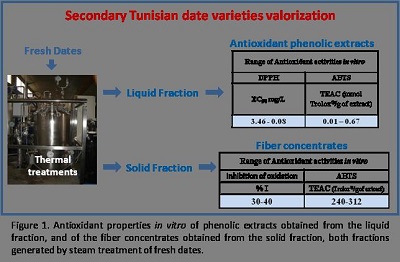
Guillermo Rodriguez Gutierrez
Spanish National Research Council, Spain
Title: Antioxidant properties of phenolic extracts and muffins enriched with date fiber concentrates obtained from date fruits (Phoenix dactylifera L.) hydrothermally treated
Biography
Biography: Guillermo Rodriguez Gutierrez
Abstract
Secondary varieties of non-commercial Tunisian dates were thermally treated by steam for its valorization. After the treatment, two phases, liquid and solid, were obtained and characterized. Sugars and phenols were solubilized to the liquid phase remaining an interesting fiber with antioxidant capacity in the solid. The concentration of phenols and the antioxidant activity were increased by the severity of the treatments in the liquid, up to 5311 mg of total phenols/Kg of fresh dates, and up to 62.5 mmol Trolox®/Kg of fresh date, respectively. Additionally, a long scale study was carried out in a pilot plant with steam treatment at 140 and 160 ºC for 30 minutes. The liquid phase was extracted and fractionated chromatographically using adsorbent or ionic resins. The phenolic profiles was determined for each fraction, yielding fractions with interesting antioxidant activities up to EC50 values of 0.08 mg/L or values of TEAC of 0.67 mmol Trolox®/g of extract. In the solid fraction a fiber concentrates (DFC) was obtained by treatments at 165 and 180C and evaluated as a source of antioxidant dietary fiber. A bakery product like muffins was prepared with 2.5 and 5% flour substitution with DFCs. The DFC-doughs presented a similar yield to the control but the muffins reached a lower volume. The texture did not increase with the density. In fact, the muffins with DFC obtained by the treatment at 165ºC were the softest tested, although they had lower cohesiveness and springiness. The proximate composition was similar among samples. The DFC-muffins had higher antioxidant capacity than the control, and obtained good scores in the sensory evaluation. Thus, the thermal treatment leads to obtain a valuable liquid rich in sugars and antioxidant phenols, and a solid rich in antioxidant fiber that can be used as a functional ingredient for baked goods.


